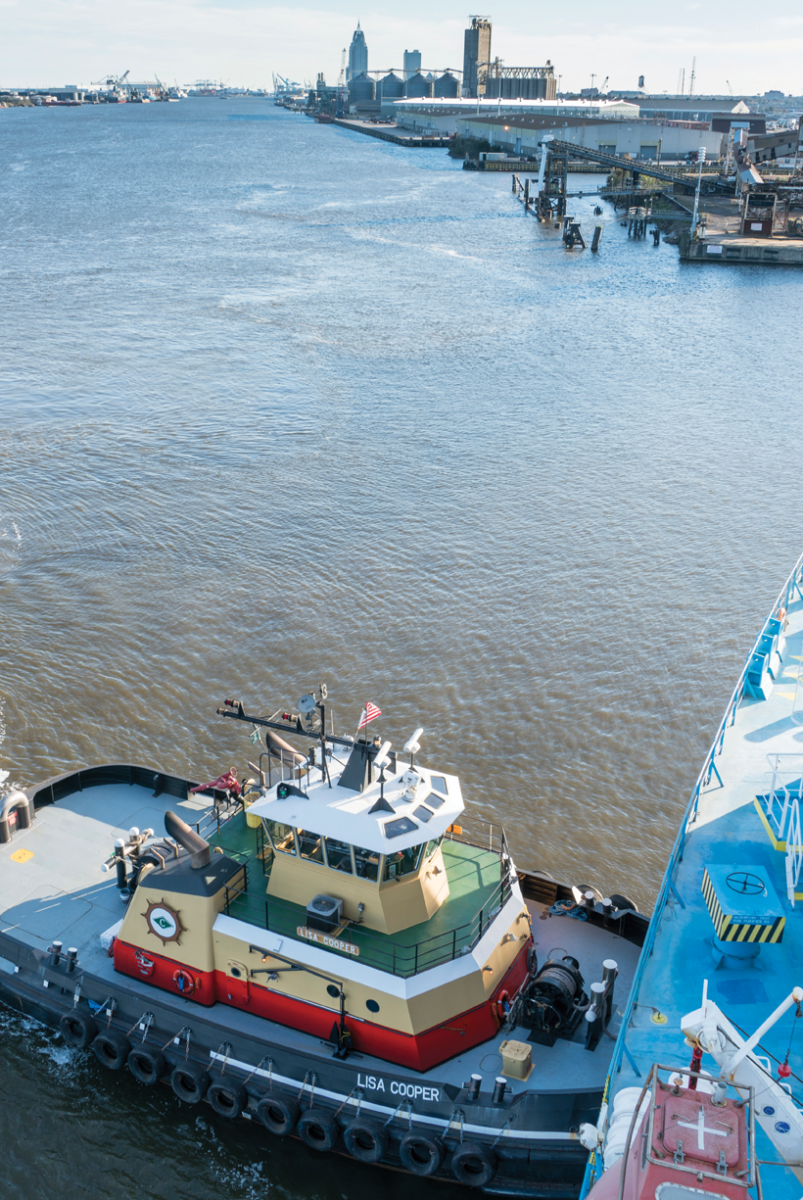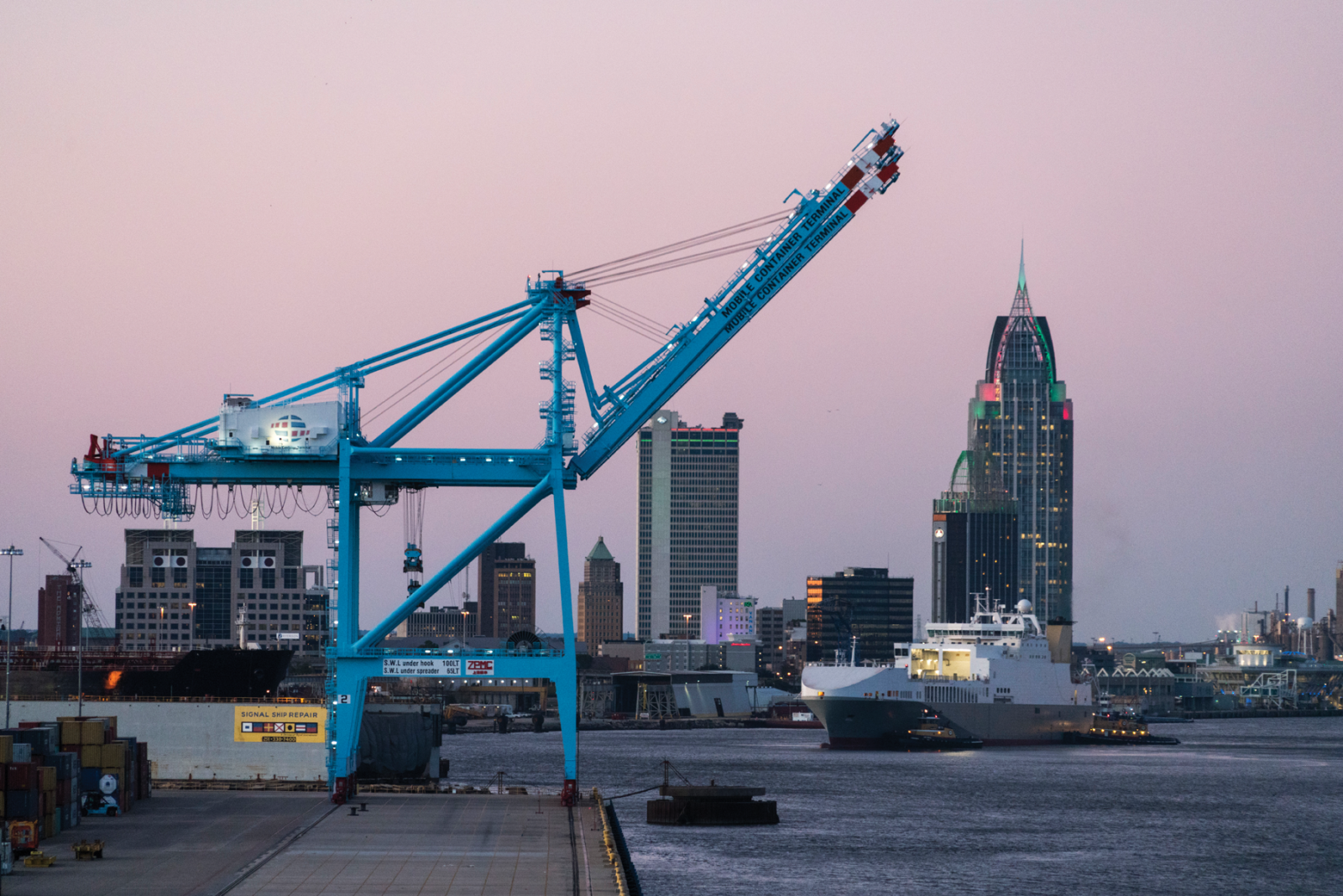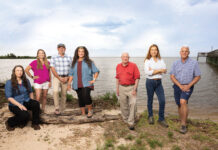Click here to read Part I of Watt Key's bar pilot adventure
It’s late December, and I’m looking forward to making my second trip with the Mobile bar pilots. On my first trip I rode a ship inbound from Dauphin Island. This time I’m taking an outbound ship with my brother, Reid.
It is 3 p.m. when we board a tugboat at the State Docks. It ferries us to the Minerva Gloria, an 800-foot Greek oil tanker docked near the Cochrane Bridge. Typically, the pilots will board the ship by climbing a rope ladder, but this ship has what looks like aluminum fire escape stairs that lower to the deck of the tug. Not long after we greet the captain in the wheelhouse, another tug arrives and delivers Jake, a 25-year-old apprentice pilot.
Once we are all aboard, the captain gives control of the ship to Reid. Then Reid and Jake begin relaying instructions to the two tugs. Here’s the problem: We are facing upriver on an 800-foot vessel, and we need to turn the ship around. The river is less than 1, 000 feet wide. Reid calls for mooring lines to be dropped, and the current begins to peel us away from the dock and swing the bow out into the channel. He then has one of the tugs pull at the stern to keep it close to the bank while he has the other tug push against the bow to keep it from swinging around too fast.
“We’ve probably got about 30 meters of clearance at the bow, ” Reid says. “If you’re standing up there it looks pretty scary. I’ve got no way to see it. I just know how long this ship is, and I know how wide the river is. All I can do is be sure I know where the stern is.”
After about a half hour of maneuvering with the tugs and thrusts from the ship’s propeller, we are turned and headed downriver. The sun is starting to set, and Downtown Mobile is glowing cool orange. We are riding at about the height of the 10th story of the RSA tower, and I’m seeing the city from an entirely new angle.

|
Reid and Jake are eyeing the port. The wheelhouse has gotten quiet. I’m getting a feeling of immense power that only comes with the thrum of a giant diesel engine, CB radios and teams of men working to maneuver something so massive. And I’m thinking, no one down there on Dauphin Street has any idea all this is going on.
“What’s our speed, Jake?” Reid asks.
“5.5 knots, ” Jake replies.
“Little faster than I’d like, ” Reid says.
“Can you slow down?” I ask.
Reid shakes his head. “This is as slow as she goes. And you have to be under power to keep the ship moving straight. Problem is, the current’s pushing against us too. You can’t control that.”
“What happens if you go too fast?”
“You start pulling stuff off the docks. Sometimes we’ll have to get a tug to tie onto the back of us and slow us down … But I think we’re good.”
“What if the tugs couldn’t get here?”
“Well, as a last resort, we could drop anchor and back against it until we got some help. Assuming we weren’t over the tunnel. And there’s all kinds of stuff on the bottom — cables and things. It’d be a big deal. Might be better to pick the least expensive thing in the harbor to run into.”
“You ever have to call a tug and say ‘Get out here quick?’”
Reid is studying the ships parked before Austal.
“Sometimes, ” he replies. Then, “Not usually.”
I sense it’s not a good time for questions. We move slowly past the RSA tower. The ice-skating rink appears far below us. Reid is temporarily distracted. “If there’s a bunch of kids out there I’ll blow the whistle, ” he says. “They like that.”
We pass three more ships dropping their lines. Aboard them are more bar pilots waiting to fall in behind Reid. In less than an hour, there will be three ships following us toward the Gulf.

|
As we ease out of the port, Reid seems to relax.
“Once we get past the coal terminal we’ll kick her in the ass, ” he says.
“Is that a nautical term?” I say.
Jake looks over at me and smiles.
“Pay attention, ” Reid snaps playfully.
But it seems to me that Jake has been doing a good job. He’s given all the instructions to the crew so far with just a few pointers from Reid. Even though he’s only 25, Jake should know his stuff. His father, Jimmy, has been the dispatcher for the Mobile bar pilots for over 50 years. Jake graduated from maritime school at Texas A&M. Then he went to work in Louisiana on supply boats to get his captain’s license. When an apprenticeship position opened with the bar pilots he began making “trips” with them in his off-time and saving his money. Apprentices are not paid and typically hold another job while they train. It is a race amongst them to build up the most trips. Almost a year ago Jake decided he’d saved enough money to quit his job in Louisiana and apprentice full-time. He’s got over 80 rides now, and out of the six apprentices, he’s first in line to be the next pilot. If traffic increases in the port, they may take on an extra pilot and he’ll get the position. Most likely Jake will be waiting until the next pilot reaches the mandatory retirement age of 67 in four years’ time.
Jake’s father calls him on the radio and asks if he’s getting on another inbound when we get into the Gulf. “His Dad wears him out, ” Reid says to me with a smile.
Jake hangs up the CB and doesn’t look amused. He’s single and he’s been talking about meeting some friends on the Causeway later that night.
“Does he want you to run that inbound?” Reid asks Jake.
“He didn’t say he wanted me to, ” Jake replies. “He just asked if I was.”
“But he implied that he wanted you to?”
“Yeah, ” Jake frowns. “He did.”
Once we’re out of the port Reid tells Jake to “kick her in the ass.”
“Full ahead, ” Jake says.
“Full ahead, ” the second mate replies.
Unlike my inbound trip, the captain has stayed in the wheelhouse. He’s a gregarious Greek who tells jokes and talks about body building and flexes his pectoral muscles for us. He also “likes iPhone very much.”
The Filipino helmsman never leaves his station, but the Ukrainian second mate has time to wander about the wheelhouse once he’s set the speed. And there are only four speeds: dead slow, slow, half, and full or “ass-kicking.”

|
I glance up at the speed indicator. I see that ass-kicking only achieves about 12 miles per hour.
“One-one-four, ” Jake says to the helmsman.
“One-one-four, ” the helmsman replies.
As the second mate wanders past me, I ask if he aspires to be a captain. “Soldier that does not want to be general is not good soldier, ” he replies.
I think about that. It seems very Russian-esque.
I realize that it has grown dark inside the wheelhouse. Night has fallen, and no one has turned on any lights.
“Darker, the better, ” Reid says from behind a radar screen. “Turning on lights in here is like turning on lights in your car at night. You just can’t see. We need to see everything that’s out there.”
After nightfall, the only things visible inside the wheelhouse are the glowing instruments, and even these are dimmed. I walk over and study the radar. It is specked with triangles ahead of us.
“What are you worried about?” I ask him.
“Couple of things right now, ” he replies. “We could be rolling a big swell. I don’t want to throw too much at the beaches. And if there’s anybody fishing the east side of Gaillard Island we could send them into the rocks. There’s not usually anybody out there this time of night and we’re pretty light, but I always think about the swell behind us. I’ll cool her down if I need to.”
Reid touches one of the triangles on the radar. The display reads a vessel name. “Then there’s this guy, ” he says. “We’ll pass him coming up the channel in about 30 minutes. I don’t recognize that name so he probably doesn’t know much about the channel. If he gets too close we’ll suck him against us and break him up.”
“Is it a ship?”
“No, it’s a tow. Barges. Everything out there are barges.”
I counted about 15 of them dotting the bay.
“Then I’m generally worried about busting up any of those tows, ” he says.
After we pass Gaillard Island, Reid gets on the radio and communicates to the inbound tow he’s been worried about.
“Captain, tighten up on those reds if you would. This girl’s pretty wide, and you’ll be meeting a couple more behind me.”

|
“Roger that. I’ll do my best.”
Reid hesitates. “Roger. Thank you, Captain.”
He hangs up the mic. “That’s what makes me nervous, ” he says. “People don’t understand the pull these things have.”
“One-one-seven, ” Jake says to the helmsman.
“One-one-seven, ” the helmsman replies.
“Overall, though, ” Reid continues, “this is a good night. Got a good handling ship. Good helmsman. No inbound traffic. Good weather.”
“What about passing another ship?”
“It’s tricky. When you get close to the edge of the channel it puts pressure on the hull and wants to push the bow out. You actually have to turn into the other ship right as you pass to compensate.”
“You have any close calls?”
“Naw, you get used to it.”
As the tow approaches I walk outside onto the bridge. Far below me I can barely make out the barges in the dark. It looks like the tug captain is “hugging the reds” as tightly as he can. He’s going to pass about 100 feet off our port side. After he passes, Reid comes out and joins me. He seems relaxed again.
“I love this time of night, ” he says.
“Good view, ” I say.
“Sometimes I come out here and just think, man I can’t believe I actually made it here. That I get to do this for a living.”
It’s a hard thing to admit that your younger brother might have a cooler job than you. But I was starting to think he might.
“It’s pretty cool, ” I say.
As we move toward the mouth of the Bay, it seems we’ve progressed beyond most of the challenges and left them to the three ships trailing us. As we cruise past Fort Morgan and into the Gulf, Reid points to starboard, and I see a distant red light angling toward us from Dauphin Island.
“Pilot boat, ” he says.
In another 15 minutes the pilot boat is traveling along our port side at the same speed. A round of goodbyes takes place with the captain and his crew, all of us shaking hands and wishing each other happy holidays. Then Reid and Jake begin putting their things into their backpacks.
On deck again I find myself looking down at the pilot boat. As I watch it rise and fall with the waves I realize that it is rough. Much rougher than when I boarded the inbound ship. Then I see that the aluminum fire-escape-like stairs are only lowered halfway down this time. At the end is the dreaded Jacob’s ladder hanging another 20 feet to the water.
“They can’t lower it when we’re underway, ” Reid says. “Just walk to the end and grab onto the rope ladder.”
This is much more treacherous than my last rope ladder. But I don’t admit my apprehension.
Reid walks down to the end of the stairs, grabs the ladder and disappears. I follow and find myself on what feels like a high dive platform, staring down at the pilot boat rising and falling beneath me. I suck it up, reach for the rungs and swing out onto it. Then I start down until I’m a few feet above the landing platform on the pilot boat. I see that I have to time this next step. I wait until the boat is rising beneath me, then leap aboard. Again I think, surely there’s got to be a better way. After all these years.
Once we’re inside the pilot boat Reid announces that he’s going below to get some sleep. He’s got about 45 minutes until we pick up the other pilots on the ships behind us, then we’re going to drop him off on an inbound vessel that’s already closing on us.
First, we pick up Dave Berault. He appears in a hole just above the water line and basically steps out of the ship. Next, we pull up to Scott Driscoll’s vessel. He comes down 30 feet of rope ladder before the pilot boat is even against the ship. Just as we pull close, the pilot boat rises on a wave and I think it’s going to crush Scott’s ankle against the hull. He doesn’t miss a step. He leaps onto the platform, timing it perfectly.
I look about. No one else seems alarmed. The ladder, I think. It is all about the ladder.
After we pick up the last man we run a mile out to Reid’s inbound ship and the pilot boat captain shouts below to wake him. Reid appears shouldering his backpack, exits the wheelhouse, leaps onto another ladder and then disappears. Then we’re all headed back to the island. The three bar pilots will stay at the pilot house, sleep and catch more inbound vessels later that night. One of the staff will take me and Jeff, the photographer, back to Mobile in one of their shuttle cars.
“Jake, ” Dave says. “I hear you’re going back in with me in a little while?” The other pilots chuckle. They all seem to like the apprentice. Jake doesn’t answer.
“Jake?” Dave says again.
“There’s still some room in the car, ” Jake replies.
text by Watt Key • photos by Jeff Haller





